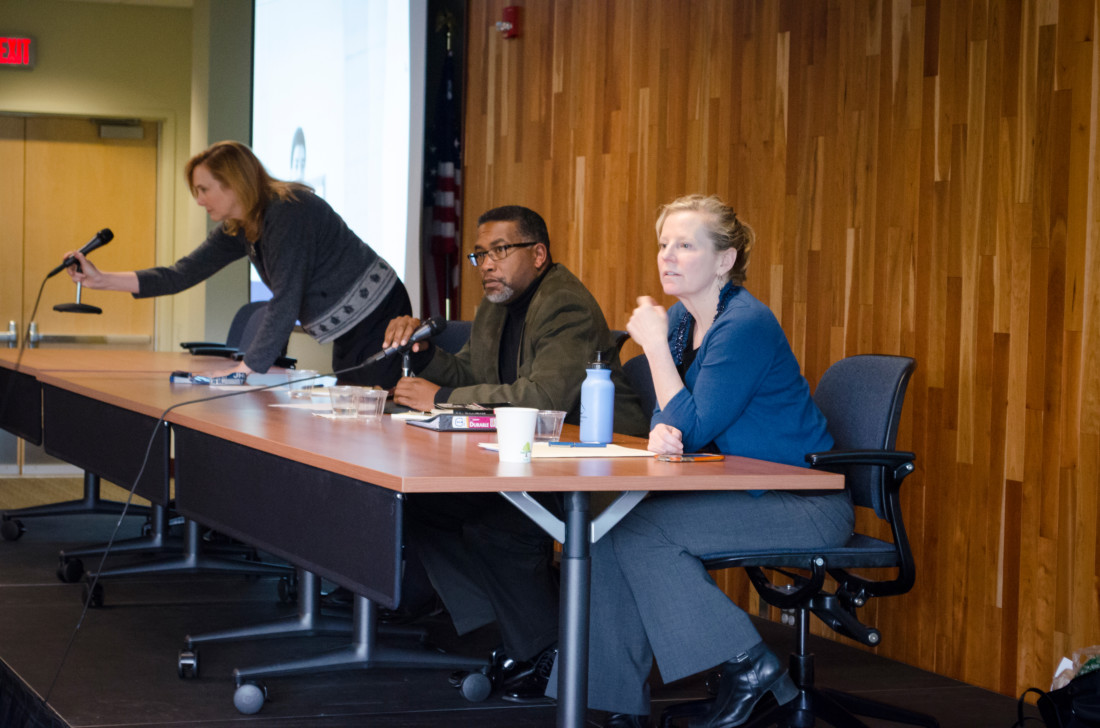UNC Asheville and the YMI Cultural Center hosted the inaugural African-Americans in Western North Carolina conference on Thursday-Friday, Oct.23-24. The event, designed to discuss an overlooked historical narrative, included speeches by Asheville civil rights leaders and scholars from UNCA and other regional universities.
“The things we hoped to accomplish with this conference include furthering the work to dismantle the longstanding myth that there was no African-American presence in this region,” said the event’s principle organizer and UNCA professor Darin Waters. “Also, we wanted to provide educators with a way to integrate this work into the larger narrative of the region, the state and the nation…. And the third was to demonstrate to a largely neglected group of our population that one of the leading institutes of higher education in this region, which UNCA is, takes their presence, their history and their contributions to this region very seriously.”
The event’s keynote was delivered by James Ferguson, a civil rights activist and founding member of the Asheville Student Committee on Racial Equality, and included recognition of Asheville resident and centenarian Julia Ray.
Early panels at the conference focused on slavery and emancipation in WNC with lectures presented by regional scholars John Inscoe of The University of Georgia, Steven Nash of East Tennessee State University and LaGarrett King of Clemson University.
Waters and Sarah Judson, both professors at UNCA, and photographer Andrea Clark spoke at the afternoon panel, which focused on segregation and civil rights.
Waters presented a paper focusing on the founding and early history of the YMI Cultural Center, including a discussion of the what he called “the myths” and mistaken oral tradition that “George Vanderbilt built the YMI for the workers on his estate… [when] this was the idea of the African-American community themselves to resist the marginalization that was taking place at this time.”
Judson’s presentation focused on a tenant strike that occurred at Hillcrest Apartments in 1967-1968 and its effect on two other public housing sites, Pisgah View Apartments and Lee Walker Heights. The strike “yields important insight into the challenges of the black freedom struggle outside the larger cities of the United States,” Judson said.
Excerpts from Sarah Judson’s discussion of tenant strikes in the late 1960s. Listen to the full audio of her presentation here.
Clark shared photos she took in Asheville’s East End neighborhood in the 1960s and ’70s. Clark’s photographs have been previously compiled in the Twilight of a Neighborhood project, sponsored by the N.C. Humanities Council, which documented the East End neighborhood before and after urban renewal.
Waters told the audience that he hopes the conference will encourage more students at UNCA and more members of the WNC community to interact with the ideas and information discussed at the conference, and the history of their communities.
“Turn your televisions off,” Waters said. “Read these books that these historians are writing …find a way to incorporate this information into your life.”






bout time.. “till you do right by me nothing will go right for you” Celie to Mister in The Color Purple. Till ASheville does right by ALL it’s residents and former residents (The Cherokee) THis town will be plagued by the rich and their woes.
I have never stopped being disgusted by the racism in this town.Subtle , endemic and entrenched
, it is the cancer that will kill this town.